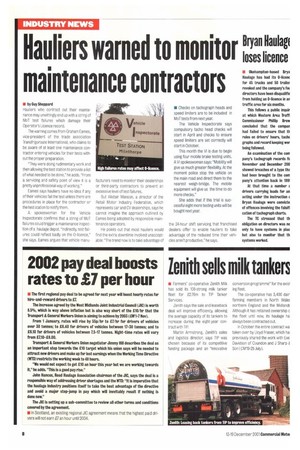2002 pay deal boosts rates to £7 per hour
Page 8

If you've noticed an error in this article please click here to report it so we can fix it.
11 The first regional pay deal to be agreed for next year will boost hourly rates for hire-and-reward drivers to £7.
The increase agreed by the West Midlands Joint Industrial Council (JIG) is worth 8.5%, which is way above inflation but is also way short of the £10/hr that the Transport & General Workers Union is aiming to achieve by 2003 (CM1-1 Nov).
From 1 January, rates will rise by 55p/hr to £7/hr for drivers of vehicles over 30 tonnes; to £6.40 for drivers of vehicles between 17-30 tonnes; and to 2610 for drivers of vehicles between 7.5-17 tonnes. Night-time rates will vary from £7.10-£8.00.
Transport & General Workers Union negotiator Jimmy Hill describes the deal as an important step towards the 110 target which his union says will be needed to attract new drivers and make up for lost earnings when the Working Time Directive (WTD) restricts the working week to 48 hours.
"We would not expect to get £10 an hour this year but we are working towards it," he adds. "This is a good pay rise."
John Hancox, Road Haulage Association chairman of the JIG, says the deal is a responsible way of addressing driver shortages and the WTD: "It is imperative that the haulage industry positions itself to take the best advantage of the directive and avoid a major step-jump in pay which will inevitably result if nothing is done now."
The JIG is setting up a sub-committee to review all other terms and conditions covered by the agreement.
• In Scotland, an existing regional JIC agreement means that the highest paid drivers will not earn E7 an hour until 2004.
























































































































































